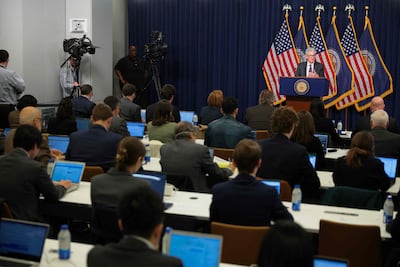Federal Reserve chairman Jerome Powell’s prognosis on the implications of what US President Donald Trump’s policies will have on the US economy can be summed up in three words: “We don’t know.”
After leaving interest rates unchanged at about 4.33 per cent on Wednesday, Mr Powell was grilled on the new administration, with many of the questions focusing on a range of policies Mr Trump has either promised or enacted since assuming office last week.
“I certainly think there was more conversation around the concept of waiting to see what new policies will do to both inflation and the economy, and I think that was true around everything that was discussed,” said Art Hogan, chief market strategist at B Riley Wealth.
The media conference represented a new reality for Mr Powell and the central bank, which is now firmly in wait-and-see mode amid strong inflation and uncertainty surrounding the Trump agenda. Traders do not expect the Fed to cut rates again until June.
I don't want to speculate, as tempting as it is, because we really don't know," Mr Powell said. "We don't know what will happen with tariffs, with immigration, with fiscal policy, regulatory policy … really, I think we need to need to let those policies be articulated before we can even begin to make that plausible assessment of what their implications will be."
Chief among those was the degree of uncertainty around Mr Trump's trade agenda. Hours after being sworn in on January 20, he threatened to impose 25 per cent tariffs on Mexico and Canada, and additional penalties on Chinese goods.
"The range of possibilities is very, very long. I don't want to speculate, as tempting as it is, because we really don't know," Mr Powell said.
But earlier on Wednesday, the Bank of Canada published a report showing a scenario in which Mr Trump followed through with the 25 per cent tariffs on Canadian goods. The central bank found that, if Canada were to impose retaliatory tariffs, both economies would suffer lower growth and higher inflation.
After lowering Canada's interest rates by 25 basis points, governor Tiff Macklem said the central bank is assessing the consequences that tariffs might have on economies. "Unfortunately, tariffs mean economies simply work less efficiently," he said.

Mr Powell, however, was less inclined to weigh in: "We want to avoid commenting, even indirectly, on the conduct of tariffs here. It's not our job. It's our job to comment on the moves that people make.
"As tempting as it is" to speculate, he steered clear of political discourse, which he has consistently done during his tenure. He also again stressed the Fed's independence.
Mr Powell would not comment on Mr Trump's demand for lower interest rates: "I'm not going to have any response or comment whatsoever, it's not appropriate. The public should be confident that we will intend to do our work as we always have."
He said he has not had any contact with Mr Trump.
Later on Wednesday the President took his first swipe at the Fed chairman for not lowering interest rates. "If the Fed spent less time on DEI [Diversity, Equality and Inclusion], gender ideology, green energy and fake climate change, inflation would never have been a problem," he said.
Mr Trump has signed executive orders ranging from ending DEI to freezing federal grants and declaring a so-called national energy emergency. He said stepping up domestic oil production and pressuring Opec to lower oil prices would help lower inflation.
"As has been our practice over many administrations, we are working to align our policies with the executive orders as appropriate and consistent with applicable law," Mr Powell said.
And when pressed on Tesla executive Elon Musk's allegations that the Fed is overstaffed, Mr Powell said the central bank wants and is aware of careful budget process. Mr Musk now runs the new Department of Government and Efficiency, whose purpose is to cut government waste and spending.
The Fed has a dual mandate of price stability and full employment, making it unique from other central banks. As the Trump administration moves to crack down on illegal immigration, the Fed has indicated that it does not want to see any further weakening of the labour market.
Mr Powell and mainstream economists have noted the role immigration has played in maintaining a healthy labour market. Mr Trump is seeking to carry out mass deportations, conduct raids on migrants across the country and has floated the possibility of reopening Guantanamo Bay to its full 30,000-person capacity to house deported migrants.
Mr Powell said central bank staff have studied a range of possible outcomes that "tend to go from really good to really bad … so that's what they do".
"We're all well aware that the range of possibilities is always broad, and not just now, but always," he said.
Despite the torrent of executive orders signed since January 20 and the Trump policies yet to come, Mr Powell played down the degree of uncertainty the Fed faces, saying it holds little comparison to the 2008 global financial crisis or the 2020 Covid-19 pandemic.
"The kind of uncertainty we have is just the ... usual level of uncertainty about the economy," he said. "But then policies are not for us to criticise or praise, really. Those are … policies which people have been elected to implement. They’re implementing them with a view to making a better economy."


